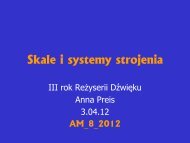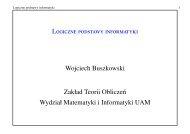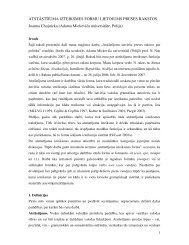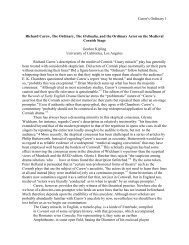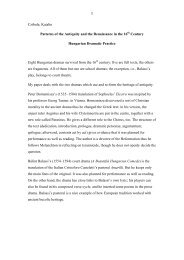Amir Weiner Getting to Know You
Amir Weiner Getting to Know You
Amir Weiner Getting to Know You
Create successful ePaper yourself
Turn your PDF publications into a flip-book with our unique Google optimized e-Paper software.
20 AMIR WEINER AND AIGI RAHI-TAMM<br />
displayed a rather commanding knowledge of the political mood and past of<br />
the management and workers. Thus the secretary was not only informed that<br />
the direc<strong>to</strong>r, a former officer in the Lithuanian army, had studied in a military<br />
academy in France, but also the amount of monthly stipend he received while<br />
he was there, the political views of the direc<strong>to</strong>r’s wife, the number of foreign<br />
languages mastered by another manager who also had an international driving<br />
license, and so on. The new direc<strong>to</strong>r was also appointed head of the party<br />
organization in the fac<strong>to</strong>ry, formalizing the role of the workplace as employer,<br />
political-ideological guardian, and information collec<strong>to</strong>r. 53<br />
On the military front, the dual-command system imposed on the<br />
vanquished armed forces of the former Baltic states was used <strong>to</strong> obtain<br />
information on alleged opponents of the regime among the uniformed<br />
men. Political instruc<strong>to</strong>rs—some 306 of all ranks—were introduced <strong>to</strong> the<br />
Lithuanian army once it was reincarnated as the People’s Army. Modeled after<br />
their Red Army counterparts, the politruks were immediately assigned with<br />
the task of identifying “unreliable elements” in the ranks. They were soon<br />
supplemented by special intelligence officers in charge of obtaining similar<br />
data. The gathering of information was unabashedly framed by preconceived<br />
ideological biases, as the chief intelligence officer of the Tenth Riflemen Corps<br />
made clear in his report on 15 September 1940. The unsatisfac<strong>to</strong>ry political<br />
situation among the troops and the local population would not improve and<br />
the rear would remain insecure, he concluded, as long as the socio-economic<br />
restructuring was incomplete. In the meantime, large segments of the troops,<br />
mainly Lithuanian nationals of the wrong social origin and political-religious<br />
views, were held under suspicion. 54 Tellingly, at a time when the dual<br />
command was abolished in the rest of the Red Army following the Winter<br />
War fiasco, it was reinforced in the newly annexed terri<strong>to</strong>ries once the already<br />
defunct Baltic armies were liquidated and fully integrated in<strong>to</strong> the Red Army<br />
in the fall of 1940. Numerically reduced and reorganized, these forces were<br />
immediately subjected <strong>to</strong> close surveillance. 55<br />
Obtaining information was complicated because of the language barrier,<br />
since the NKVD Special Department and the political instruc<strong>to</strong>rs sent from<br />
Russia had not mastered Lithuanian. The authorities had no qualms about<br />
making temporary compromises and allowed the recruitment of instruc<strong>to</strong>rs<br />
of the right social and political background from the disbanded People’s<br />
53 LYA f. 1771, ap. 190, b. 1, ll. 112–15.<br />
54 Rossiiskii gosudarstvennyi voennyi arkhiv (RGVA) f. 892, op. 3, d. 21, l. 255.<br />
55 For the Lithuanian Politburo’s deliberations and decree on the issue, see LYA f. 1771, ap.<br />
190, b. 1, ll. 25–27. For surveillance reports on the political views and activities of servicemen,<br />
see LYA f. K-1, ap. 19, b. 1, ll. 1, 7–9, 10–31, 32–38, 39–42, 75–80, 87–90.



